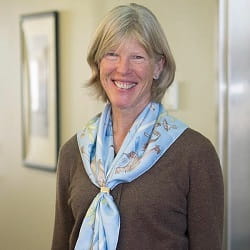
3/25/2021
The prize is awarded annually to an American biomedical researcher who has made significant, progressive contributions to medicine. The award consists of a specially commissioned medal, a $50,000 honorarium and an invitation to present the Dickson Prize Lecture on campus. Due to the COVID-19 pandemic, the date of Kenyon’s lecture has not yet been determined.
“It is our honor to present Dr. Kenyon with the School of Medicine’s most prestigious award,” said
Anantha Shekhar, M.D., Ph.D., Pitt’s senior vice chancellor for the health sciences and John and Gertrude Petersen Dean of Medicine. “Undoubtedly, Dr. Kenyon has fundamentally shaped our understanding of aging biology. Her work to overturn long-held assumptions about the aging process and her discovery of molecular mechanisms that modulate aging demonstrate the exceptional and influential research that the Dickson Prize recognizes.”
“I’m honored to receive this award,” said Kenyon, who is an emeritus professor of biochemistry and biophysics at the
University of California, San Francisco (UCSF), and vice president of aging research at
Calico Life Sciences, LLC, an Alphabet subsidiary focused on aging and age-related disease. “I’m grateful to my mentors and lab members and to all those who continue to explore this exciting and promising area of biology.”
Kenyon graduated as valedictorian in chemistry and biochemistry at the University of Georgia and completed her Ph.D. at the
Massachusetts Institute of Technology (MIT). While studying at MIT, Kenyon pioneered the identification of genes on the basis of their expression profiles, discovering repair genes activated by DNA-damaging agents. As a postdoctoral fellow at the
Medical Research Council in Cambridge, England, she helped to demonstrate the universality of developmental pattern formation.
In 1993 as a faculty member at UCSF, Kenyon discovered that a single gene mutation could double the lifespan of healthy roundworms—a finding that sparked an intensive study of the molecular biology of aging. Her research showed that the aging process is not random and haphazard as previously thought but, instead, is subject to active genetic regulation. Her work led to the realization that a hormonal network influences the rate of aging in many organisms, possibly including humans.
Since then, Kenyon and her lab members discovered a variety of genes that influence aging by coordinating diverse processes that protect cells and tissues. In addition, Kenyon and her team found that different kinds of tissues work together to control the pace of the aging process, and that individual neurons and germ cells can control an animal’s lifespan.
PHOTO INFO: (click image for larger version)
CREDIT: Calico Life Sciences
CAPTION: Cynthia Kenyon, Ph.D., emeritus professor of biochemistry and biophysics, University of California, San Francisco, and vice president of aging research at Calico Life Sciences, LLC.

 PITTSBURGH – Cynthia Kenyon, Ph.D., a molecular biologist whose research has redefined our understanding of aging, has accepted the 2021 Dickson Prize in Medicine, the University of Pittsburgh School of Medicine’s highest honor.
PITTSBURGH – Cynthia Kenyon, Ph.D., a molecular biologist whose research has redefined our understanding of aging, has accepted the 2021 Dickson Prize in Medicine, the University of Pittsburgh School of Medicine’s highest honor. 















